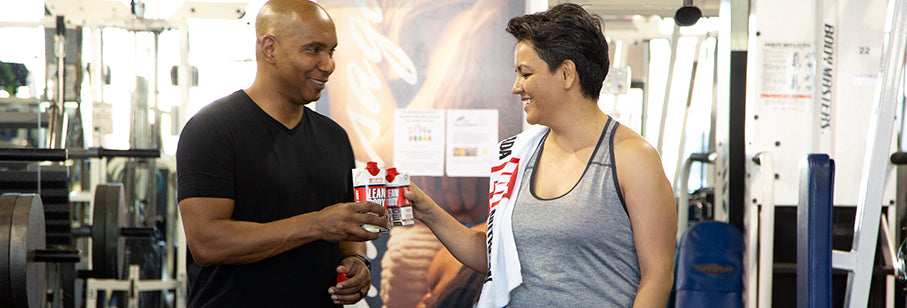If you’re a Lean Body newsletter subscriber, you’ve probably already watched this short video by Lee Labrada, founder and CEO of Labrada Nutrition. (If you missed it when it was first posted back in March, it’s worth watching now.) In it, Lee shares the shocking results of a new study published in the Journal of Nutrition, Health and Aging. According to said study, American adults over 50 years of age are incredibly deficient in protein.
That’s right; deficient.
This fact threw Lee for a loop, and it might surprise you too. How can Americans be deficient in protein when protein talk is everywhere?
But the numbers don’t lie. The study – which evaluated the protein intake of 11,680 adults aged 51 and older – showed over 40% of these adults ate less than three meals per day. Up to a third of them were as much as 30 grams short of their daily recommended protein requirement. Interestingly, people who weren’t getting enough protein also had lower-quality diets overall, and ate fewer healthy vegetables, seafood, and dairy products.
Why do we bring this up again?
Because it’s too important not to. Protein is essential for helping your body function on multiple levels. To skimp on protein is to deprive yourself of wholesome, complete nutrition that you need to be your best.
Now, you might be thinking, “I’ve got aloooong way to go till I’m 50. What’s this study got to do with me?” Fair question, but protein is essential at any age. It’s also important to establish healthy habits early on, so that they come naturally to you in your golden years.
No matter where you fall on the age spectrum – a young Millennialor proud Baby Boomer – it’s never too early (or too late) tolevel-up your diet with protein. It doesn’t have to be difficult, either. Think tasty, think easy, think RTD- Ready-to-Drink. More on that in a bit!
For our fabulous 50+ friends
Have you ever heard of sarcopenia?It’s a fancy name for age-related muscle loss. Put simply, sarcopenia makes it harder for you to grow and keep muscle as you age. You may also find yourself feeling weaker and less energetic than you used to, especially during exercise. Interestingly, regular exercise is a powerful tool in fighting sarcopenia. Resistance(or weight) training, in particular, can help keep you in muscle-building mode, while safeguarding the lean muscle you’ve already built.
Guess what else can help you fight sarcopenia? That’s right; protein. Quality protein can help keep your muscles stronger and functional longer. It’s like Lee says, “feed it or lose it!”
But don’t just eat a hard-boiled egg and call it a day. You need a lot more than that! If you’re over 65, your protein requirements can be as much as twice that of a younger adult. That’s why the study mentioned earlier was so shocking. People who needed more than average amounts of protein were eating far less than average.
Don’t worry; you don’t have to dramatically revampyour diet. It’s about making simple nutrition switches that can have a big impact on the way you look, feel, and function.
For our friends at any age
The more you know about protein, the more you’ll see why it deserves a starring role in your nutrition plan. Here are just a few ways that protein can support your fitness and wellness goals:
- Muscle growth & function – Protein is made up of amino acids, and amino acids are the building blocks of muscle tissue. Think of protein as your muscles’ primary food source. If your muscles aren’t properly nourished, they’ll struggle to develop. You’ll also have a hard time keeping the muscle you’ve already built. Conversely, consuming protein post-exercise and at every snack/meal can help you build and maintain strong, lean muscles – the kind needed for everyday activity and optimal athletic performance.
- Weight loss – Muscle burns more calories at rest than fat does, so the more lean muscle you have (thanks in part to protein), the faster your metabolism will be. Another calorie burning advantage? Your body has to work harder to digest high-protein foods than it does high-fat or high-carb foods, so it burns more calories in the process. Lastly, protein helps keep you feeling fuller for longer, making you less likely to reach for extra snacks or to over-eat at your next meal.
- Smarter food choices – Carbohydrates typically raise your blood sugar levels, causing all sorts of ups and downs with your mood and energy levels. But pairing your carbs with protein can help balance things out. When your blood sugar levels are more balanced, your food cravings typically subside, and you tend to make better food choices.
Quality protein coming right up!
It’s easy to see why many people don’t get enough protein. Admittedly, grabbing “just anything” can seemso much easier. It takes all of two minutes to slap a PB&J sandwich together, or to order food at your favorite drive-through. But not only do these options fall terribly short on healthy nutrition, they aren’t any quicker than a delicious, high-protein Lean Body RTD shake.
With 40 grams of quality protein in every delicious serving, Lean Body RTDs make it easier than ever to meet your daily protein requirements. Enjoy them for breakfast, after a heart-pumping workout, or anytime throughout your day. These shakes are ready to drinkfor a reason – so that you always have delicious, high-protein nutrition at your fingertips, and you never have to grab just anything again.
Lean Body RTDs support all the goals we mentioned earlier – from simply upping your protein intake to building muscle, losing fat, and improving your overall nutrition. More than just a quick protein fix, Lean Body RTDs contain 20+ essential vitamins and minerals in a rich, creamy, sugar-free formula. So, if you’re trying to watch your sugar intake while getting more protein, this RTD is for you
Visit www.leanbody.com to start filling those protein gaps today!
Please Let Us Know If You Enjoyed This Article.
Your Feedback Is Important To Us
Disclaimer: This content is for informational purposes only and is not meant as medical advice, nor is it to diagnose or treat any medical condition. Please consult your physician before starting or changing your diet or exercise program. Any use of this information is at the sole discretion and responsibility of the user.












